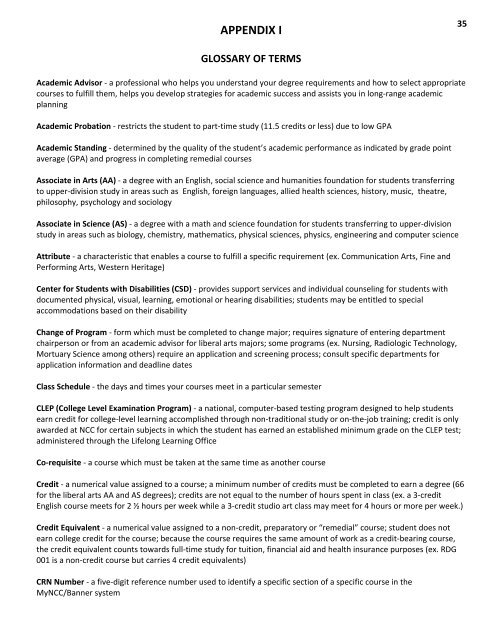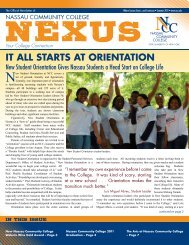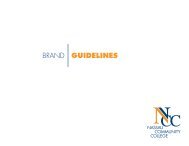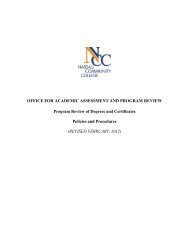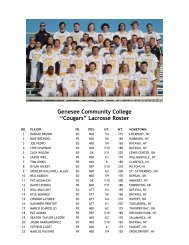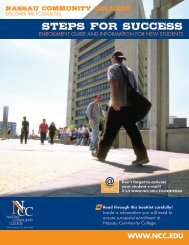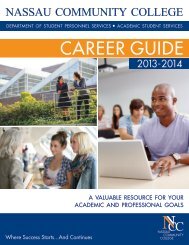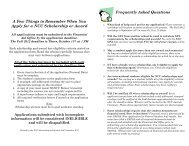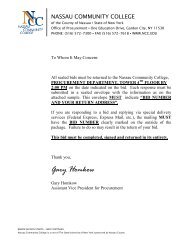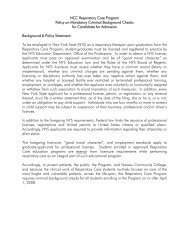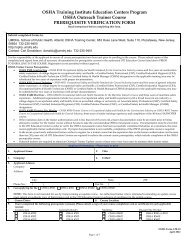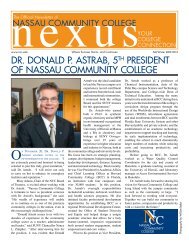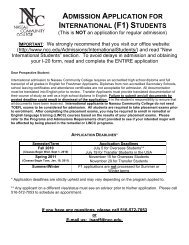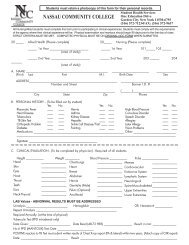APPENDIX I - Nassau Community College
APPENDIX I - Nassau Community College
APPENDIX I - Nassau Community College
You also want an ePaper? Increase the reach of your titles
YUMPU automatically turns print PDFs into web optimized ePapers that Google loves.
<strong>APPENDIX</strong> I35GLOSSARY OF TERMSAcademic Advisor ‐ a professional who helps you understand your degree requirements and how to select appropriatecourses to fulfill them, helps you develop strategies for academic success and assists you in long‐range academicplanningAcademic Probation ‐ restricts the student to part‐time study (11.5 credits or less) due to low GPAAcademic Standing ‐ determined by the quality of the student’s academic performance as indicated by grade pointaverage (GPA) and progress in completing remedial coursesAssociate in Arts (AA) ‐ a degree with an English, social science and humanities foundation for students transferringto upper‐division study in areas such as English, foreign languages, allied health sciences, history, music, theatre,philosophy, psychology and sociologyAssociate in Science (AS) ‐ a degree with a math and science foundation for students transferring to upper‐divisionstudy in areas such as biology, chemistry, mathematics, physical sciences, physics, engineering and computer scienceAttribute ‐ a characteristic that enables a course to fulfill a specific requirement (ex. Communication Arts, Fine andPerforming Arts, Western Heritage)Center for Students with Disabilities (CSD) ‐ provides support services and individual counseling for students withdocumented physical, visual, learning, emotional or hearing disabilities; students may be entitled to specialaccommodations based on their disabilityChange of Program ‐ form which must be completed to change major; requires signature of entering departmentchairperson or from an academic advisor for liberal arts majors; some programs (ex. Nursing, Radiologic Technology,Mortuary Science among others) require an application and screening process; consult specific departments forapplication information and deadline datesClass Schedule ‐ the days and times your courses meet in a particular semesterCLEP (<strong>College</strong> Level Examination Program) ‐ a national, computer‐based testing program designed to help studentsearn credit for college‐level learning accomplished through non‐traditional study or on‐the‐job training; credit is onlyawarded at NCC for certain subjects in which the student has earned an established minimum grade on the CLEP test;administered through the Lifelong Learning OfficeCo‐requisite ‐ a course which must be taken at the same time as another courseCredit ‐ a numerical value assigned to a course; a minimum number of credits must be completed to earn a degree (66for the liberal arts AA and AS degrees); credits are not equal to the number of hours spent in class (ex. a 3‐creditEnglish course meets for 2 ½ hours per week while a 3‐credit studio art class may meet for 4 hours or more per week.)Credit Equivalent ‐ a numerical value assigned to a non‐credit, preparatory or “remedial” course; student does notearn college credit for the course; because the course requires the same amount of work as a credit‐bearing course,the credit equivalent counts towards full‐time study for tuition, financial aid and health insurance purposes (ex. RDG001 is a non‐credit course but carries 4 credit equivalents)CRN Number ‐ a five‐digit reference number used to identify a specific section of a specific course in theMyNCC/Banner system
36Degree Evaluation ‐ a tool that evaluates your progress towards completing your degree; found in the “StudentRecords” menu of the MyNCC/Banner systemDiscipline ‐ a branch of instruction or learning, a subject area (ex. the disciplines of history and economics)Distance Learning ‐ also called Distance Education; a planned teaching/learning experience in which the teacher andstudent are separated by physical distance and/or time and use a wide spectrum of media to communicate with eachother; course requirements are satisfied using video, audio and/or computer‐based materialEducational Counselor ‐ a counselor who works with at‐risk students on academic probation who require specialattention to recover academicallyElectives ‐ courses that do not fulfill specific attribute categories but are needed to reach the 66 credits required forthe AA and AS degrees; courses that give the liberal arts student an opportunity to explore areas outside of the liberalarts (ex. Business, Criminal Justice); additional liberal arts courses not needed for a specific requirement which allowfor more in‐depth study in a student’s area of interestGED Program ‐ an alternative program for students who have not graduated from high school or obtained a GeneralEquivalency Diploma through testing; students earn 24 college credits in specific subjects while completingrequirements for the GED; credits earned in the program count towards the Associate DegreeGeneral Education ‐ a set of specified categories of courses that contribute to the development of an educated personwho thinks clearly, communicates effectively, makes informed and thoughtful judgements, distinguishes among setsof values, displays an appreciation for learning and applies knowledge to the understanding of the human experienceGrade Point Average (GPA) ‐ a number which reflects a student’s academic progress; each letter grade has anumerical equivalent (ex. A = 4, B+ = 3.5); when the numerical value of each letter grade is multiplied by the numberof credits for the associated course, the result is called quality points; total quality points divided by total creditsATTEMPTED (including credits for any failed course) results in the student’s GPA; must have a GPA of at least a 2.0 tograduate and 3.5 or higher to graduate with honorsIncomplete Grade (INC) ‐ may be assigned to a student who has not satisfied all the academic requirements for acourse but can reasonably be expected to complete the work; assigned at the discretion of the instructor; missingwork must be completed by the end of the following semester or the grade will convert to an “F”Internship ‐ an opportunity to gain practical experience in a particular fieldLiberal Arts ‐ a broad term for the academic areas of social sciences, natural sciences, mathematics, fine arts,literature and the humanitiesLife Experience Credit ‐ credit granted by some academic departments for knowledge obtained through practical, realworldexperience; assessment of eligibility for life experience credit is done by the chairperson of the correspondingacademic department according to departmental criteriaMatriculated ‐ enrolled in a college or university as a candidate for a degree; requires submitting proof of high schooldiploma or GED and official transcripts from prior college work as well as completion of placement testing, unlessexemptMixed Delivery Course ‐ a course that requires a combination of attendance in the classroom as well as online workvia the internet; also referred to as a hybrid courseMyNCC/Banner ‐ <strong>Nassau</strong> <strong>Community</strong> <strong>College</strong>’s student information and registration system which allows all studentsto view their academic and financial records and allows students to register independently, unless they are restricted
37NCC ID # ‐ often called your “N” number (because it begins with a capital “N”); referred to as “USER ID” in theMyNCC/Banner system; should be memorized because it is needed for all college businessNon‐Matriculated ‐ attending classes without enrolling for a degree program; appropriate for students only needingto take a few courses; student is prevented from enrolling in courses that require placement testing as a prerequisite,unless exempt from testingOnline Course ‐ a course conducted solely via the internet using Blackboard Campus Edition 8; enrolled studentsaccess the course using their NCC ID #s and passwordsPrerequisite Course ‐ a course which must be completed before taking another courseRemedial Course ‐ a non‐credit math, reading or English course which prepares a student for college‐level work;requirement based on placement test results; student must enroll in any required remedial course beginning in thefirst semester of enrollment and cannot withdraw from the class; must continue with remedial courses in subsequentsemesters until courses completed; if not completed within three attempts, student will be dismissed from thecollege; see “Credit Equivalent”Residency Requirement ‐ the minimum number of credits that must be earned through coursework at NCC in order toobtain a degree or certificate from <strong>Nassau</strong> <strong>Community</strong> <strong>College</strong>; 33 credits for degrees and 15 credits for certificates;transfer credit or credit earned from AP, IB or CLEP exams or from Life Experience is NOT considered credit completedin residenceSemester ‐ a fifteen‐week period of time when classes are in session during fall (September – December) and spring(mid‐January through mid‐May); referred to as “Term” in the MyNCC/Banner systemSummer Session ‐ five‐week sessions offered May through August; may enroll for a maximum of 18 credits forsummer; listed as a “term” in the MyNCC/Banner systemSUNY GER (SUNY General Education Requirements) ‐ courses that must be completed toward a Bachelors Degreefrom any SUNY school; selecting courses at NCC that have a SUNY GER Attribute in MyNCC/Banner will satisfy thecorresponding requirement for a Bachelor’s degree if transferring to a SUNY schoolTelecourse ‐ also known as “<strong>College</strong> of the Air”; a fully‐credited, college‐level course that combines the viewing oftelevision programs, video/DVD, streaming media via the internet and/or radio broadcasts with independentassignments and a minimum number of on‐campus meetingsTransfer Credit ‐ credits applied for coursework completed elsewhere; may be awarded as a result of equivalentcollege‐level courses completed in high school or at another college with a minimum grade of “C” earned, by meetingminimum required scores in acceptable AP, IB or CLEP exams or by credit for work completed during military service orpolice academy attendance; must submit official transcripts and/or exam results to Admissions prior to the student’sfirst semester, or to the Registrar thereafter, to earn transfer creditWinterim ‐ a three‐week session offered between fall and spring semesters; classes meet five days per week; only onecourse may be attempted; limited course offerings; listed as a “Term” in the MyNCC/Banner system


